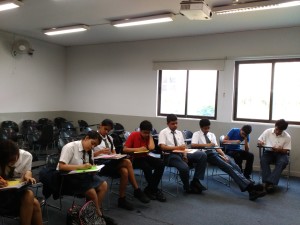Who am I? What defines me?
Difficult questions. Questions that require introspection and honesty. We spent a few classes discussing these questions, and more, while on the section on Identity in the PeaceWorks Human Rights Defenders module.
The students first used one word that could possibly be used to define them.
‘My art’ said one. Another student said that he was a geek. Another said football.
We moved onto whether or not they were defined by their religion and whether or not their identity as a Bengali or as Marwari was an identity at all. Most agreed that their religion did not define them. A few said that they found it hard to define themselves according to the ‘ Bengali’ and ‘ Marwari’, stereotypical origin based categories.
‘ The question these days is not about who you are. It is what you are, ‘observed one of the students while we were talking about religious identity.
Our identities and how we define ourselves can change according to circumstance. It also changes in front of others. Taking forward from what one student said after reading out the piece ‘Not Like Strawberries’ by Bikram Ghosh, we addressed the question ‘How would others describe me?’, moving onto how we see ourselves and whether or not we are defined by any material possession.
‘ The way we look, the cars we own, the place we live in—in today’s world, this is what determines our identity. But according to me, these don’t.’ said one of the students.
‘I think that what determines identities anywhere are the experiences, environment, situation at any given point of time. Change is hard to avoid and everyone, after one point, is bound to change someway or the other’, said another.
The discussion then veered toward bias. What does bias mean to the students? Do they recognise any bias within themselves?
‘How do we demarcate the line between bias and choice? asked one of the students. One of the examples given was the decisions one makes during the so-called arranged marriage process. Would one ‘pick’ a prospective partner from a high ranking college or a low ranking one? Or a partner from the same caste or a different one? Do choices based on stereotypical notions about a certain college for example, indicate bias?
One of the students suggested that bias need not be completely unfounded. Another suggested that our experiences contribute towards shaping our biases. In many cases (for example the caste choice during an ‘arranged’ marriage), an inherent bias can be seen, but can that bias be passed off as a ‘personal choice’ or a ‘personal decision’?
Recognising bias within oneself is not easy as the students realised. Neither is admitting to bias. One of the students, a gamer, said he was biased towards software from another country. Another said that she was biased against people who don’t love animals.
Difficult questions? Perhaps. But challenging ones. And ones that allow the students to really explore the concept of identity. Ones that, it is hoped, they will continue to discuss and debate on.
‘ But inside we know that identity is a lot more yes-es and no-es. Inside we know that this messy business called humanity will allow us more leeway than that.
What am I?
I’m a Maybe’
A Question of Identity, Jerry Pinto
– Paroma Sengupta

